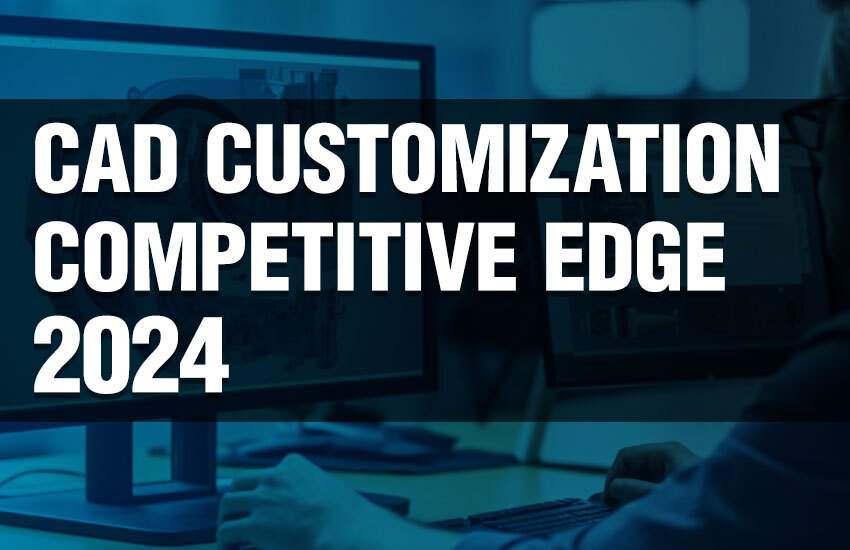
In today's ever-evolving manufacturing and design and engineering landscape, staying ahead of the curve is critical for businesses of all sizes and for this, “Computer-Aided Design (CAD)” has become an indispensable tool for professionals across various industries. By tailoring CAD software to your specific needs, you can improve efficiency, streamline workflows, and gain a significant competitive edge.
As we move into 2024, CAD customization emerges as a pivotal factor that can set companies apart in terms of efficiency, precision, and overall productivity. Organizations can enhance their competitive edge significantly with this ability to tailor CAD software to meet specific business needs.
CAD customization refers to the process of modifying CAD software to fit the unique requirements of a particular user or organization or business. This can involve a variety of modifications, such as:
Developing custom third-party tools and features
Automating similar or repetitive tasks by using macros or scripts
Integrating CAD software with other enterprise systems, such as ERP or PLM
Modifying the user interface to improve usability for a more streamlined workflow
Check out what is the need for CAD Customization in our blog post Why CAD Customization is Needed?

A study shows that companies that leveraged CAD customization reported a 25% increase in productivity. By tailoring software to specific workflows, businesses can minimize time spent on redundant tasks. For instance, utilizing custom scripts in Creo CAD software can automate repetitive design processes, allowing engineers to focus on innovative solutions rather than manual entries.
CAD customization facilitates better collaboration among teams, that is between engineers, designers, and other stakeholders. With tools like BricsCAD software and other online CAD software, custom features can be integrated to ensure that team members have access to the same data and tools. This can lead to faster product development cycles and improved communication. This uniformity is crucial for maintaining design integrity and streamlining communication, especially in remote work environments.
In industries such as manufacturing and construction, accuracy is paramount. Customized CAD tools can help minimize human errors by automating calculations and providing real-time feedback. For example, Modelcam Technologies offers tailored solutions that can directly enhance the precision of designs, ultimately leading to higher quality products. By automating tasks, you can reduce the risk of human errors and ensure greater accuracy in your designs.
By streamlining workflows and improving efficiency, CAD customization can help you reduce overall design costs.
In today's competitive marketplace, businesses that can design and manufacture products faster and more efficiently are more likely to succeed. CAD customization can give you the edge you need to stay ahead of the competition.
Find out how CAD customization can boost productivity of your business in our comprehensive blog, 3 Ways CAD Customization Can Boost Your Productivity by 20%!
Companies need to adopt strategic approaches to fully harness the potential of CAD customization. Few ways to do this are:-
Every business has its own unique requirements. Companies can pinpoint areas where customization could lead to efficiency gains with the help of an internal analysis. This could involve seeking solutions for complex geometries, specialized materials, or industry-specific regulations.
For effective customization, choosing the right CAD software is crucial. Programs like Creo software and BricsCAD offer extensive customization options, enabling users to modify features easily. Furthermore, the rise of CAD software online has made it more accessible for companies to experiment with different tools without significant upfront investment.
The success of CAD customization heavily relies on the skills of the workforce. Investing in training programs ensures that employees can maximize the capabilities of customized tools. Online training platforms provide flexible learning options, making it easier for teams to adapt to new software features quickly.
Here are a few specific examples of how CAD customization can be used to improve business processes:
A custom tool can be created to automate the generation of bills of materials (BOMs). This can save engineers a significant amount of time and effort.
A macro can be written to automatically check designs for potential errors.
CAD software can be integrated with a product lifecycle management (PLM) system to provide a central repository for all product data. This can improve collaboration and communication between different departments.
If you are interested in exploring the benefits of CAD customization, there are a few things you can do:
Assess your needs: The first step is to identify your specific needs and challenges. What areas could benefit from improved accuracy or collaboration?
Evaluate your options: There are a variety of ways to customize CAD software. You can develop customizations in-house, work with a third-party developer, or purchase pre-made add-on tools.
Consider the costs: The cost of CAD customization will vary depending on the complexity of the customizations you require.
While CAD customization offers numerous advantages, it is essential to be aware of potential challenges. Customizing software can lead to compatibility issues with existing systems or increased maintenance costs. Furthermore, over-customization can complicate future upgrades or migrations to newer software versions.
To mitigate these risks, companies should work with experienced vendors like Modelcam Technologies, who can provide guidance on best practices for CAD customization. They can assist in striking the right balance between tailored solutions and standard features, ensuring long-term sustainability.
As we progress through 2024, several trends are shaping the future of CAD customization:
AI Integration: The incorporation of artificial intelligence into CAD software is expected to enhance customization capabilities, enabling predictive modeling and automated design suggestions.
Cloud-based Solutions: The increasing reliance on online CAD software allows for seamless updates and collaboration, further facilitating customization efforts.
User-Centric Design: There is a growing focus on creating user-friendly interfaces that adapt to individual preferences, enhancing the overall user experience.
CAD customization is not just an option but a necessity for businesses looking to maintain a competitive edge in 2024. By investing in tailored solutions and utilizing powerful software like Creo CAD software and BricsCAD software, organizations can significantly improve their operational efficiency, collaboration, and accuracy. As industries continue to evolve, those who embrace customization will undoubtedly lead the charge into a more innovative future. For businesses in the USA and beyond, now is the time to explore the benefits of CAD customization and leverage it for lasting success.
Let’s connect: www.modelcamtechnologies.com
Email: sales@modelcamtechnologies.com
Mobile no : +91 8237016167
©Copyright 2025. All rights reserved by Modelcam Technologies Private Limited PUNE.